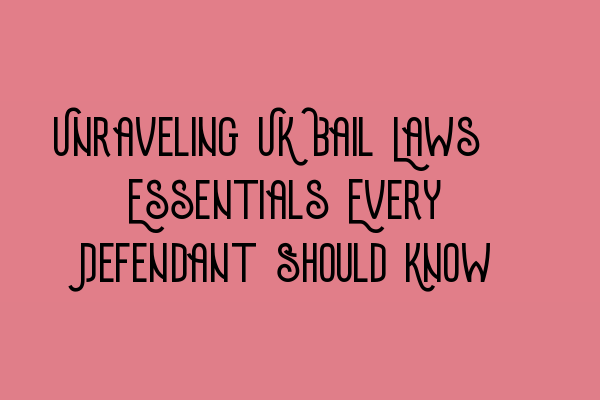Unraveling UK Bail Laws: Essentials Every Defendant Should Know
As criminal law solicitors at SQE Criminal Law & Practice Law UK, we understand the importance of providing
our clients with comprehensive information about the UK’s legal system. When it comes to defending against
criminal charges, understanding bail laws is crucial. In this article, we will unravel the essentials of UK
bail laws that every defendant should know.
What is Bail?
Bail is the temporary release of an accused individual under certain conditions, ensuring their cooperation with
the legal process. It serves as a way to balance the defendant’s constitutional rights with public safety and the
interests of justice.
Factors Considered for Bail Determination
When a defendant is brought before a court, the judge considers several factors to determine whether bail should
be granted. These factors may include:
- The seriousness of the offense
- The defendant’s prior criminal record
- The likelihood of the defendant fleeing or failing to appear in court
- The potential danger the defendant poses to the community
Types of Bail
There are several types of bail available in the UK:
- Cash Bail: The defendant pays a certain amount of money as a guarantee of their appearance in
court. - Conditional Bail: The defendant is released on the condition that they comply with certain
requirements, such as attending counseling or surrendering their passport. - Surety Bail: A third-party, such as a friend or family member, agrees to take responsibility
for the defendant’s appearance in court and pledges a sum of money as security. - Release on Recognizance: Also known as “own recognizance,” this allows the defendant to be
released without the need for monetary deposits or a surety.
Importance of Legal Representation
Receiving strong legal representation is essential when dealing with bail matters. An experienced criminal law
solicitor can help argue for bail on your behalf, ensuring that all relevant factors are presented in a
persuasive manner. They can also guide you through the bail application process and help address any concerns
the court may have.
Conclusion
Understanding UK bail laws is crucial for defendants facing criminal charges. By familiarizing yourself with the
factors considered in bail determination and the different types of bail available, you can navigate the legal
process more effectively. If you require legal assistance, consult with our experienced criminal law solicitors
at SQE Criminal Law & Practice Law UK.
For more information on preparing for the SQE exams, check out our related articles:
